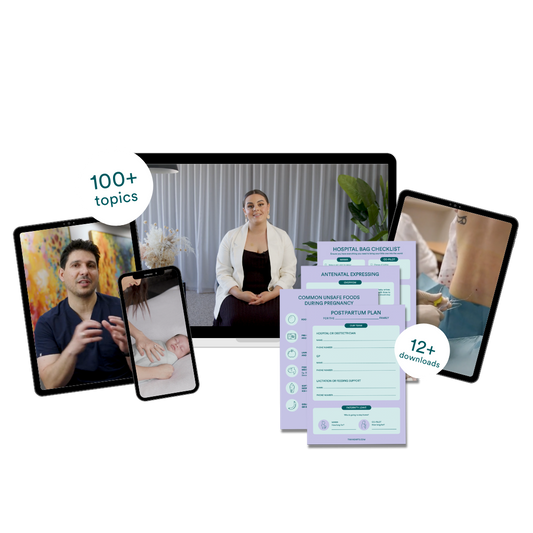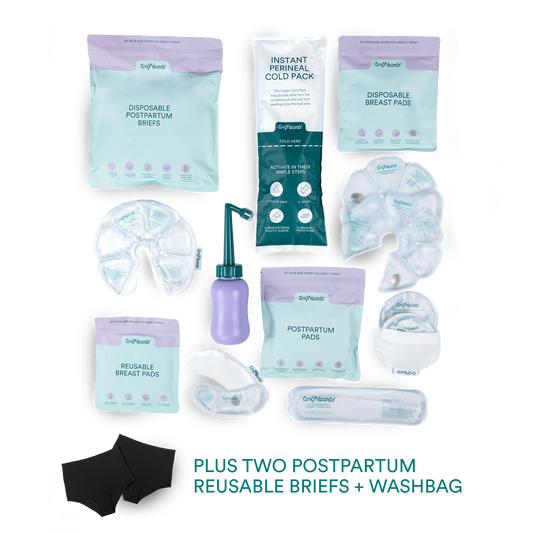Up to 1 in 3 mamas experience birth trauma. There were 294,400 babies born in Australia last year. If those stats are true, 98,133 of those mamas may have experienced birth trauma. That's in 2020 alone. When you consider that the papa bears and support people who also experience birth trauma aren't included in those statistics, you have to wonder, how many people are actually affected by it?
As promised in the first blog of this series; What a Midwife wants you to know, this blog will cover all things birth trauma, including what is it, how to debrief + why it's important.
What is birth trauma?
The word 'trauma' refers to any serious wound, injury or damage to a person, whether physical, emotional or mental. So, birth trauma can relate to a range of things, but in general, 'birth trauma' refers to any physical, mental or emotional damage or injury that occurred during or because of childbirth. It can happen in any birth, not just a mama's first. In saying that, just because it happened in a previous birth doesn't mean it will happen again.
Yes, birth trauma can absolutely be related to the physical pain or damage you experienced during birth. Maybe you had inadequate pain relief, or an episiotomy was cut, and you felt it. Other times, it could be from an emergency that happened during birth that left you or your support person extremely distressed, like a postpartum haemorrhage. But it can also be the emotional and mental parts of birth that affect you just as deeply, even in the absence of physical damage. Perhaps you felt like you weren't heard, you had no control over your body or that things you have no idea about were happening to you without your knowledge or consent. If your birth trauma relates to the loss of a bub, my heart breaks for you, and I'm so sorry. Other times, it can result from the shock of birth not going as planned or as you expected, an unexpected NICU admission, resuscitation on bub after birth, a lack of support or pregnancy/ birth complications or interventions.
Seeing your bub being resuscitated is traumatic. Seeing your blood pooling on the floor is traumatic. Seeing your wife/ girlfriend/ partner/ sister/ daughter screaming in pain during labour and birth is traumatic. So is watching them being rushed to theatre with no idea what's going on. Hearing bub's heartbeat drop and watching the panic in the room start to rise is traumatic. Having your knees pulled back to your shoulders while someone rocks back and forth on your pubic bone to free your bub during a shoulder dystocia is traumatic. Wanting or not wanting something and getting pushback from your health care team is traumatic. Going through birth or the postpartum period without support is traumatic. Whatever your birth trauma may be from, you need to know that these are your feelings, and THEY ARE VALID.
I know we have quite a few health professionals who follow Tiny Hearts, so if you're reading these and you're feeling trauma being stirred up inside of you from witnessing these events, please speak to someone. Don't bury it down. There are so many avenues for support, and keeping it to yourself doesn't make you a better Doctor, Nurse or Midwife, but it does continue to make you a traumatised one.
Signs + symptoms
You might experience some, a few or all of these signs + symptoms. These symptoms might come on shortly after birth or sometime after the birth has passed. Some mamas and papa-bears don't even recognise them in themselves- it's not until another person points it out that they realise they're struggling.
- Being triggered to feel intense fear, helplessness or horror by reminders from birth such as seeing the hospital, hearing a song playing at that time, seeing your Midwife, smelling the room aroma.
- Turning to risky behaviours, including using and abusing alcohol and drugs.
- Difficulty bonding with bub.
- Fear of health professionals or the place bub was born at.
- Being agitated, hyper-aware or anxiety symptoms [butterflys in your tummy, heart palpitations, sweating, jelly legs etc.].
- Some amnesia from birth or the time shortly afterwards.
- Experiencing flashbacks, nightmares, anxiety, unexplained crying episodes, panic attacks or trouble sleeping.
- Feeling isolated, irritable, guilty, numb, emotional or detached.
- Avoiding reminders of and talking about birth.
- Ongoing distress from physical birth injuries.
Who is at increased risk?
Some circumstances put a mama or her support person at increased risk of experiencing birth trauma, including:
- Feeling unheard, disrespected and unsupported during labour + birth.
- Extreme pain due to insufficient pain relief during labour.
- Thinking you were going to die during labour + birth.
- Witnessing or being involved in an emergency during labour + birth.
- Previous stillbirth or neonatal loss.
- Previous sexual abuse.
- Pre-existing or a history of mental health conditions, such as anxiety.
- Physical birth injuries that may or may not have caused long term damage.
- Previous birth trauma.
Treatment
If birth trauma isn't identified and treated, it can intensify into PTSD [Post Traumatic Stress Disorder]. 2-3% of mamas will go onto develop PTSD after birth, and up to 25% will develop some symptoms of it.
Treatment for physical birth trauma will depend on the pain and symptoms you are experiencing and the type of damage sustained during birth. The best person to discuss this with is your Obstetrician at your birth, your GP or a women's health physio.
For mental birth trauma related injuries, one of the first steps toward preventing or treating birth trauma is debriefing [which I will explain in more detail below]. A mama or support person may access counselling sessions through a referral for a mental health plan from a GP, or self-referral to a private counsellor or psychologist. A GP may also refer to a psychiatrist. During these sessions, the health provider will discuss your symptoms with you, what led to the onset of these symptoms and ways you can manage them. They may also recommend more intense treatment, including medication or Cognitive Behaviour Therapy.
I know that admitting face to face to someone that you are struggling can be daunting, but as the saying goes, 'it ain't weak to speak'. If you're too scared and won't speak to anyone face to face straight away, a good place to start can be:
- Lifeline: 13 11 14
- Gidget Foundation: 1300 851 758
- Suicide call back service: 1300 659 467
- Beyond Blue: 1300 224 636
- MensLine Australia: 1300 789 978
Some good websites to find resources are:
- https://www.panda.org.au
- https://gidgetfoundation.org.
au - https://www.mybirthstory.org.
nz/home - https://www.cope.org.au
- https://www.dadsgroup.org
Debriefing
Any mamas or support people that experience difficulty or emotional distress during pregnancy, labour, birth or the postnatal period should debrief, if willing and able. In the hospital, your Doctor or Midwife may ask you after birth if you both understand your birth, what happened and why, and if you're feeling ok about it all. If you or your support person are distressed or answer no to any of the above, your Midwife or Doctor should offer an opportunity to debrief. It's when the health professionals involved meet up with a mama and her support person, along with the notes from birth, to go through the events that unfolded and the decisions that were made. A mama and support person should be given an opportunity to express how they felt, give feedback and ask any questions.
If you're still in hospital but haven't been offered a debrief session, you can ask your Midwife to arrange one for you. If you've left the hospital, you can contact them and ask to arrange a meeting.
Final notes
Some mamas that I've spoken to in the past have blamed themselves for their birth trauma. "Maybe if I spoke louder, they would've listened to me. Maybe if I read more books, I would've known better. Maybe if I just did what they said, things would've turned out better." Nope. None of that is true. You didn't cause your birth trauma. Sometimes birth goes perfectly to plan, sometimes it plays out beautifully on its own, and sometimes it doesn't. You can't solely blame yourself for your birth trauma, particularly when birth involves so many things that you have no control over.
I experienced birth trauma with my first bub, Poppy. I ignored it, buried it down and told myself that I was a Midwife, so I didn't have a right to be traumatised. That escalated into not sleeping or waking in the night with panic attacks because I was obsessed with making sure she was breathing. It was my husband who dragged me to get help, and that was the hardest part. Asking for help doesn't make you weak; it makes you strong, mama. I was educated and informed; I advocated for myself; I had birth education and knowledge; I was still traumatised. It truly can strike anyone, and if it affects you, please mama, speak up. After all, 'it ain't weak to speak".








